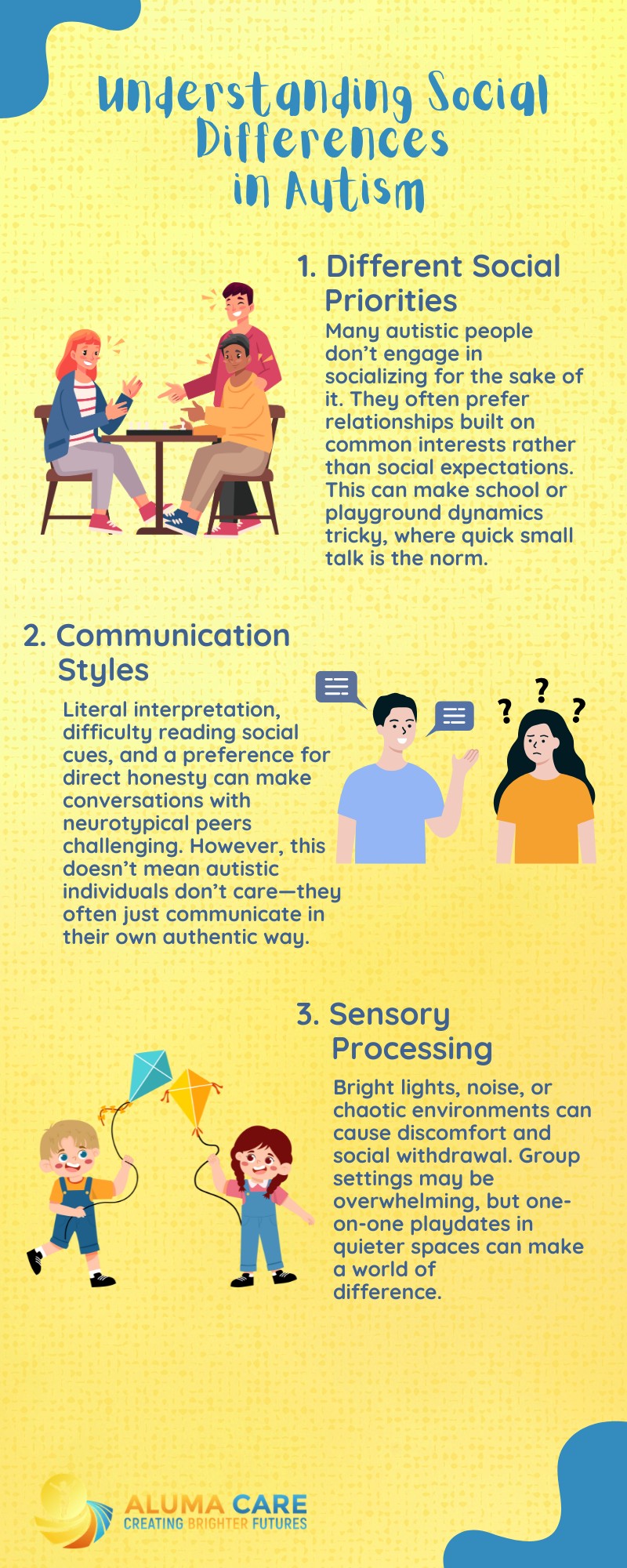Key Points:
- Autistic people do experience friendship, but the way they understand and express it can look different from neurotypical norms.
- Communication preferences, sensory sensitivities, and social fatigue all influence how friendships form and thrive.
- With the right support and understanding, meaningful and lasting friendships are very much possible for autistic individuals.
Friendship is complicated for everyone, but if you're a parent of an autistic child, it can feel like navigating an entirely different social map. Maybe your child doesn’t seem interested in other kids—or maybe they care deeply but just don’t know how to connect. You're not alone in wondering about this.
Do Autistic People Experience Friendship?
Yes, they do—just in ways that might surprise you. Autistic individuals form strong, meaningful connections, but their approach to friendship might look different. When we explore autism and friendship, we must let go of narrow social expectations and embrace the rich, varied ways humans connect.
Autistic people often value honesty, shared interests, and loyalty over small talk and group dynamics. Their friendships can be deep and lasting—but sometimes go unnoticed because they don’t always follow neurotypical “scripts.”
Understanding Social Differences in Autism
Autism is a spectrum, and so is the way autistic people relate to others. Let’s look at how sensory needs, communication styles, and emotional processing affect friendships.

Signs That an Autistic Child Wants Friendship
It’s a myth that autistic individuals don’t want friends. In fact, many feel deeply about their relationships, even if they struggle to show it.
What to look for:
- They talk about someone repeatedly or in great detail.
- They mimic another child’s interests or phrases.
- They express concern when someone is upset.
- They seek proximity, even if not verbal.
These are all signs of social connection—but they may not look like what you expect. Understanding autism and friendship requires us to broaden our definition of what social engagement looks like.
Building and Supporting Friendships for Autistic Individuals
Once we understand that autistic people do want friendship, the next step is to nurture environments where these friendships can grow.
Create Structured Opportunities
Autistic children often thrive with predictability. Structured playdates with clear start and end times, a shared activity, and a calm environment can help them relax and connect.
Teach Social Scripts
While neurotypical children might pick up social rules naturally, autistic children may benefit from being explicitly taught. Think of it like giving someone a manual for a game everyone else is playing without instructions.
Foster Shared Interests
Special interests—whether it’s dinosaurs, anime, or weather systems—can be a powerful connector. Finding clubs, events, or even online communities around these passions can help form organic, meaningful friendships.
Common Challenges in Maintaining Friendships
As children grow, friendships become more nuanced, and the challenges may increase—but so do the opportunities for meaningful connection.
Navigating Misunderstandings
Autistic children may struggle with sarcasm, indirect communication, or shifting friendship dynamics. This can lead to conflict or exclusion, often unintentionally.
How parents can help:
- Role-play common scenarios.
- Teach how to ask for clarification.
- Encourage resilience after social setbacks.
Coping with Social Burnout
Even positive social interactions can be exhausting. Recognizing and respecting your child’s need for downtime is crucial.
Let your child know it’s okay to say, “I need a break,” and work with teachers or caregivers to make space for those needs without shame.
_20250709_220455_0004%5B1%5D.jpg)
How Parents Can Encourage Friendship
Parental involvement can significantly influence how well an autistic child navigates the social world. That doesn’t mean forcing playdates—but it does mean creating supportive opportunities.
Practical ways to support:
- Advocate for inclusive activities in schools or community centers.
- Model inclusive behavior by welcoming diverse friendships at home.
- Offer social stories or books about friendship from an autistic perspective.
- Stay in regular touch with teachers to understand how social skills are developing.
Autism And Friendship In Adulthood
Friendship challenges don’t disappear after childhood, but adult autistic individuals often find more control in choosing relationships that honor their boundaries and needs.
Some autistic adults thrive in online communities where text-based communication feels safer. Others find friendship in shared workspaces, hobbies, or advocacy groups.
Many, however, express a deep desire for connection, loyalty, and shared values over quantity of social interaction. The path to friendship for autistic adults might look quieter, slower, or more deliberate—but it can be just as fulfilling, if not more so.
When Friendship Struggles are Hurting: Seeking Support
If your child is frequently left out, experiencing bullying, or emotionally distressed about friendships, it’s okay to seek professional support. Social difficulties can impact mental health, self-esteem, and even academic performance.
ABA therapy (Applied Behavior Analysis) can offer structured, research-backed methods to help autistic individuals build social skills, regulate emotions, and form lasting relationships. It’s not about changing who they are—but about helping them navigate a world that often misunderstands them.
Explore How ABA Therapy Can Support Autism And Friendship
At Aluma Care, we believe every child deserves the chance to build meaningful, joy-filled relationships. Our ABA therapy services are designed not just to support behavior, but to empower communication, connection, and confidence.
Our expert therapists create customized plans that include:
- Social skills development
- Emotional regulation strategies
- Structured play support
- Parent coaching and training
If you’re looking for compassionate, professional ABA therapy in Kansas, New Hampshire, and Virginia, we’re here to help. Whether your child is struggling to make friends or simply needs help navigating social dynamics, Aluma Care can be your partner on this journey.
Reach out today and discover how we can support your family. Friendship is possible—and we’re here to help it flourish.



.jpg)
.jpg)
.jpg)
.jpg)
.jpg)
.jpg)
.jpg)
%20(1).jpg)
%20(1).jpg)
.jpg)
.jpg)
.jpg)







.png)